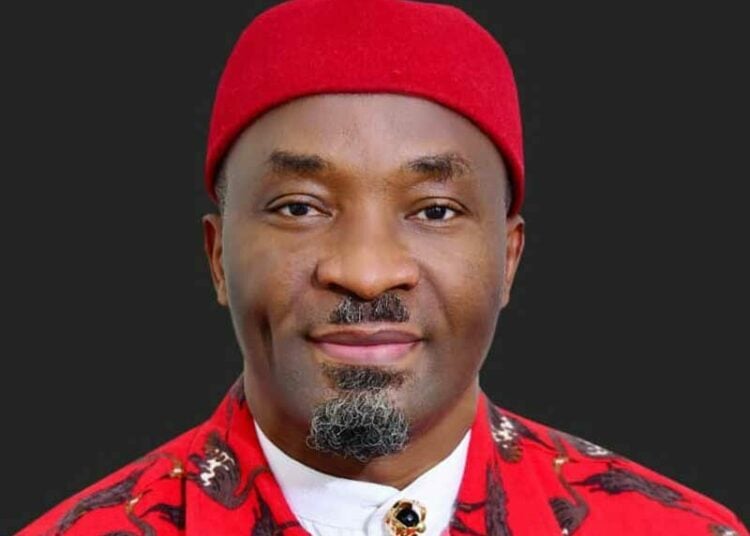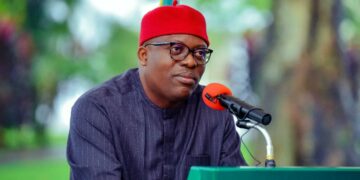In an age of political noise, he has chosen light, dialogue, and reform.
A Parliamentarian with Purpose
As Deputy Speaker of Nigeria’s 10th House of Representatives, Rt. Hon. Benjamin Okezie Kalu, PhD, CFR, has brought new grace and gravitas to legislative leadership.
He combines the mind of a scholar with the instincts of a diplomat — legislating not for headlines, but for impact.
From constitutional reform to regional development, gender inclusion to peace advocacy, Kalu’s record affirms what leadership looks like when intellect meets intent.
He speaks softly, but his ideas reshape institutions.
Scholar, Strategist, Statesman
Born on May 5, 1971, in Agbamuzu, Bende LGA of Abia State, Kalu’s story begins where public service and scholarship intersect.
He holds a PhD in Public Policy and Strategic Studies (University of Abuja), an LL.M in Terrorism and International Humanitarian Law (Distinction, University of Calabar), an MBA from Oxford Brookes University (UK), and an LL.B (Hons.) from Calabar.
His academic journey continues — he is currently pursuing an LL.D in Law — proof that for him, learning is leadership’s lifelong twin.
Beyond degrees, he has honed his craft at Harvard Kennedy School, University of Miami, UNICRI (Italy), John Cabot University, and the Chartered Institute of Arbitrators (UK).
Each credential deepened the foundation for what he does best — turn complex policy into achievable law.
From Local Governance to the National Stage
Kalu’s political life began at home, as Chairman of Bende Local Government Area — a role in which he first practiced the inclusive, people-centric leadership that defines him today.
He later served as Executive Adviser to the Governor of Abia State on MDGs and International Relations, positioning local development within a global framework.
When he entered the House of Representatives in 2019, he brought with him not ambition, but agenda: strengthen institutions, humanise governance, and modernise lawmaking.
As Chairman of the House Committee on Media and Public Affairs, he became the articulate voice of the 9th Assembly — defending accountability while deepening citizens’ understanding of legislative work.
By the 10th Assembly, his colleagues elevated him to Deputy Speaker, trusting the steadiness of his hand and the clarity of his mind.
The Legislator of Record
Few lawmakers in Nigeria’s modern history have matched his legislative productivity.
Kalu has sponsored over 120 bills — a record that spans virtually every sector of governance.
His bills range from constitutional alterations to justice sector reforms, gender equity, education, economic productivity, security, and public service renewal.
Among them are landmark proposals such as:
The South East Development Commission (SEDC) Bill, designed to rebuild the region’s post-war infrastructure and economy.
The State Police Bill, providing a framework for local security management suited to Nigeria’s complex federal reality.
The Special Seats for Women in Parliament Bill, aimed at correcting the gender imbalance in elective representation.
The Federal University of Medical and Health Sciences, Bende (Establishment) Bill, and the Federal College of Education, Bende (Establishment) Bill, bringing higher education home to his constituency.
These proposals are not symbolic. They carry the logic of reform and the discipline of results — proof that vision and legislative craft can coexist.
Leadership Beyond the Chamber
As Chairman of the House Committee on the Review of the 1999 Constitution, Kalu now leads one of Nigeria’s most consequential national assignments.
His mandate: to modernise the constitutional framework, deepen devolution, and strengthen national unity.
In that role, he has displayed the temperament of a builder — listening to stakeholders, balancing regional aspirations, and ensuring inclusivity in the constitutional conversation.
He also represents Nigeria on the global parliamentary stage:
Chairman, ECOWAS Parliament Committee on Administration, Finance and Budget
Member, Pan-African Parliament
Steering Committee Member, WTO Parliamentary Conference
Member, Inter-Parliamentary Union (IPU)
Each platform amplifies his advocacy for governance reforms and Africa’s voice in global decision-making.
The Private Sector Lens
Kalu’s success in governance draws partly from his private-sector background.
He has served as Director at firms across three continents — Solcarbon SA-NV (Belgium), Ozbok Australia PTY Ltd, and Belcarbon SA (Belgium) — experiences that sharpened his appreciation for institutional discipline, fiscal transparency, and strategic growth.
Today, as Principal Arbitrator at Silk Partners LLP (Nigeria), he continues to bridge business law and public policy, mentoring the next generation of lawyers and policymakers.
Peace in the South-East Project (PISE-P)
Beyond parliament, Kalu’s greatest legacy may be moral, not legislative.
Through the Peace in the South-East Project (PISE-P), he convenes leaders, traditional rulers, youth, and faith groups to promote dialogue and non-kinetic solutions to insecurity in the region.
PISE-P’s message is simple but profound: peace is not the absence of tension, but the presence of understanding.
This initiative has become a model of community-driven conflict resolution — reframing politics as healing, not hostility.
Where others build walls, he builds conversation.
A Humanitarian Heart
For over two decades, the Benjamin Kalu Foundation has quietly touched lives across Nigeria through healthcare, education, and empowerment programmes for women, youth, and persons with disabilities.
His foundation embodies the conviction that representation must extend beyond the chamber to the communities that send leaders there.
It is this balance — between public duty and private compassion — that has made Kalu one of Nigeria’s most admired legislators.
Honours and Humanity
In recognition of his national service and contribution to democratic consolidation, President Bola Ahmed Tinubu, GCFR, conferred on him the honour of Commander of the Order of the Federal Republic (CFR) in 2024.
But Kalu’s truest honour, he often says, “is the trust of the people of Bende.” At 54, he stands as a generational bridge — a legislator fluent in both the language of reform and the rhythm of empathy.




